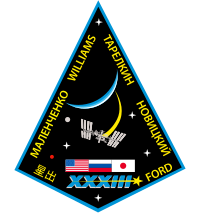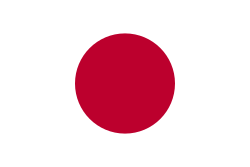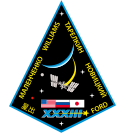Expedition 33
| Expedition 33 | |||
 | |||
| Uppdragsstatistik | |||
|---|---|---|---|
| Rymdstation: | ISS | ||
| Start: | 16 september 2012, 23:09 UTC[1] | ||
| Slut: | 18 november 2012, 23:09 UTC[1] | ||
| Antal besättningsmedlemmar: | 6 st | ||
| Rymdpromenad | |||
| Antal rymdpromenader: | 1st | ||
| Total tid: | 6 timmar, 38 minuter | ||
| Transport | |||
| Uppskjutning: | med Sojuz TMA-05M, Sojuz TMA-06M | ||
| Uppskjutningsplats: | Kosmodromen i Bajkonur | ||
| Landning: | med Sojuz TMA-05M, Sojuz TMA-06M | ||
| Landningsplats: | Kazakstan | ||
| Kronologi | |||
| |||

Expedition 33 var den 33:e expeditionen till Internationella rymdstationen (ISS). Expeditionen började den 16 september 2012 då delar av Expedition 32s besättning återvände till jorden med Sojuz TMA-04M .
Kevin A. Ford, Oleg Novitskij och Jevgenij Tarelkin anlände till stationen med Sojuz TMA-06M den 25 oktober 2012.
Expeditionen avslutades den 16 september 2012 då Sunita Williams, Jurij Malentjenko och Akihiko Hoshide återvände till jorden med Sojuz TMA-05M.
Besättning
| Position | Första delen (16 september - 25 oktober 2012) | Andra delen (25 oktober - 18 november 2012) |
|---|---|---|
| Befälhavare | Hennes andra rymdfärd | |
| Flygingenjör 1 | Hans femte rymdfärd | |
| Flygingenjör 2 | Hans andra rymdfärd | |
| Flygingenjör 3 | Hans andra rymdfärd | |
| Flygingenjör 4 | Hans första rymdfärd | |
| Flygingenjör 5 | Hans första rymdfärd | |
Referenser
- ^ [a b] NASA's Space Station Expedition 33 Arkiverad 11 december 2012 hämtat från the Wayback Machine., läst 1 september 2016.
Externa länkar
| |||||||||||||||||||
Media som används på denna webbplats
The crew members of the Expedition 34 mission put together the following description of their patch: "The outer border of the Expedition 34 patch takes the mold line of a crew transfer or generic resupply vehicle which will form our bridge to the orbiting outpost throughout the second half of its operational lifetime. Inscribed inside in gold is a craft symbolizing future extra-terrestrial landers that will someday open other celestial destinations to human exploration. Our Sun, which enables the miracle of the only known life in our universe, radiates above the rich and colorful orb of Earth. Its 15 rays represent the countries of the International Space Station (ISS) Partnership whose foresight and sacrifice have enabled the first small steps into our universe. The ISS in flight represents the dedication, ingenuity, and cooperation amongst the thousands and thousands of workers around the globe who have successfully designed and built a wonder of our modern world. The distant stars, like those visible in our night sky, beckon us to come further into the depths of space. 'Off the Earth. . . For the Earth' - Our acknowledgement of the responsibility and commitment to work diligently for all inhabitants of planet Earth."
Expedition 33 crew members take a break from training at NASA's Johnson Space Center to pose for a crew portrait. Pictured from the left are NASA astronaut Sunita Williams, commander; along with Russian cosmonaut Yuri Malenchenko, Japan Aerospace Exploration Agency (JAXA) astronaut Akihiko Hoshide, Russian cosmonaut Evgeny Tarelkin, Russian cosmonaut Oleg Novitskiy and NASA astronaut Kevin Ford, all flight engineers.
The Expedition 33 patch depicts the International Space Station (ISS) orbiting around the Earth, and into the future. The national flags of Japan, Russia, and the United States of America represent the crew of Expedition 33, which consists of six astronauts and cosmonauts from Japan, Russia and the United States. The five white stars represent the partners participating in the ISS Program – Canada, European countries, Japan, Russia and the United States. Expedition 33 will continue the work of the previous thirty-two expedition crews on board the multi-national laboratory in areas such as biology and biotechnology, earth and space science, educational activities, human research, physical and material sciences, and technology development and demonstration.
This patch represents the 32nd expedition to the International Space Station (ISS) and the significance of the science being conducted there for current and future generations. The arch shape of the patch symbolizes the "doorway" to future space exploration possibilities. The ISS, an orbiting laboratory above the Earth, provides a unique perspective for Earth observation and monitoring. The flame depicts the pursuit of knowledge and highlights the importance of education as the key to future human space flight. The astronaut symbol circles the Earth, acknowledging the work of all astronauts, past, present, and future. The names of each crew member located on the border of the patch are written to honor the various cultures and languages on the mission. The three flags also depict the home countries of the Expedition 32 crew members and signify the collaborative ISS partnership of 15 countries working as one.






